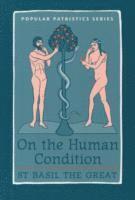
endast ny
On the Human Condition
"This introduction brings together major themes in Greek Patristic anthropology - the image of God in the human being the Fall from Paradise, and the human condition in the present life and in the age to come. St. Basil the Great addresses the questions posed by the human condition with characteristic clarity, balance, and sobriety." "The volume begins with two discourses on the creation of humanity and a homily on the causes of evil, translated into English for the first time, and contains a new translation of a famous homily meditating on our human identity and experience. The volume also includes Letter 233 to Amphilochius of Iconium, St. Basil's spiritual son - a succinct and pointed discussion of how the human mind functions, the activity for which God created it, and how it can be used for good, evil, or morally neutral purposes. This letter complements the discussion of emotions in St. Basil's Homily against Anger, also included in this volume. Finally, the book includes excerpts from St. Basil's fatherly instructions to his ascetic communities, commonly known as the Long Rules, or the Great Asceticon."--BOOK JACKET.Title Summary field provided by Blackwell North America, Inc. All Rights Reserved
Utgiven: 2005
ISBN: 9780881412949
Förlag: St Vladimir's Seminary Press,U.S.
Format: Häftad
Språk: Engelska
Sidor: 126 st
"This introduction brings together major themes in Greek Patristic anthropology - the image of God in the human being the Fall from Paradise, and the human condition in the present life and in the age to come. St. Basil the Great addresses the questions posed by the human condition with characteristic clarity, balance, and sobriety." "The volume begins with two discourses on the creation of humanity and a homily on the causes of evil, translated into English for the first time, and contains a new translation of a famous homily meditating on our human identity and experience. The volume also includes Letter 233 to Amphilochius of Iconium, St. Basil's spiritual son - a succinct and pointed discussion of how the human mind functions, the activity for which God created it, and how it can be used for good, evil, or morally neutral purposes. This letter complements the discussion of emotions in St. Basil's Homily against Anger, also included in this volume. Finally, the book includes excerpts from St. Basil's fatherly instructions to his ascetic communities, commonly known as the Long Rules, or the Great Asceticon."--BOOK JACKET.Title Summary field provided by Blackwell North America, Inc. All Rights Reserved
Ny bok
144 kr151 kr
5% studentrabatt med Studentapan
Begagnad bok (0 st)
Varje vecka tillkommer tusentals nya säljare. Bevaka boken så får du meddelande när den finns tillgänglig igen.



